
Hate and debate Rome through the world hath spread,
Yet Roma amor is, if backward read.
Then is’t not strange Rome hate should foster? No:
For out of backward love all hate doth grow.
— Sir John Harington

Hate and debate Rome through the world hath spread,
Yet Roma amor is, if backward read.
Then is’t not strange Rome hate should foster? No:
For out of backward love all hate doth grow.
— Sir John Harington
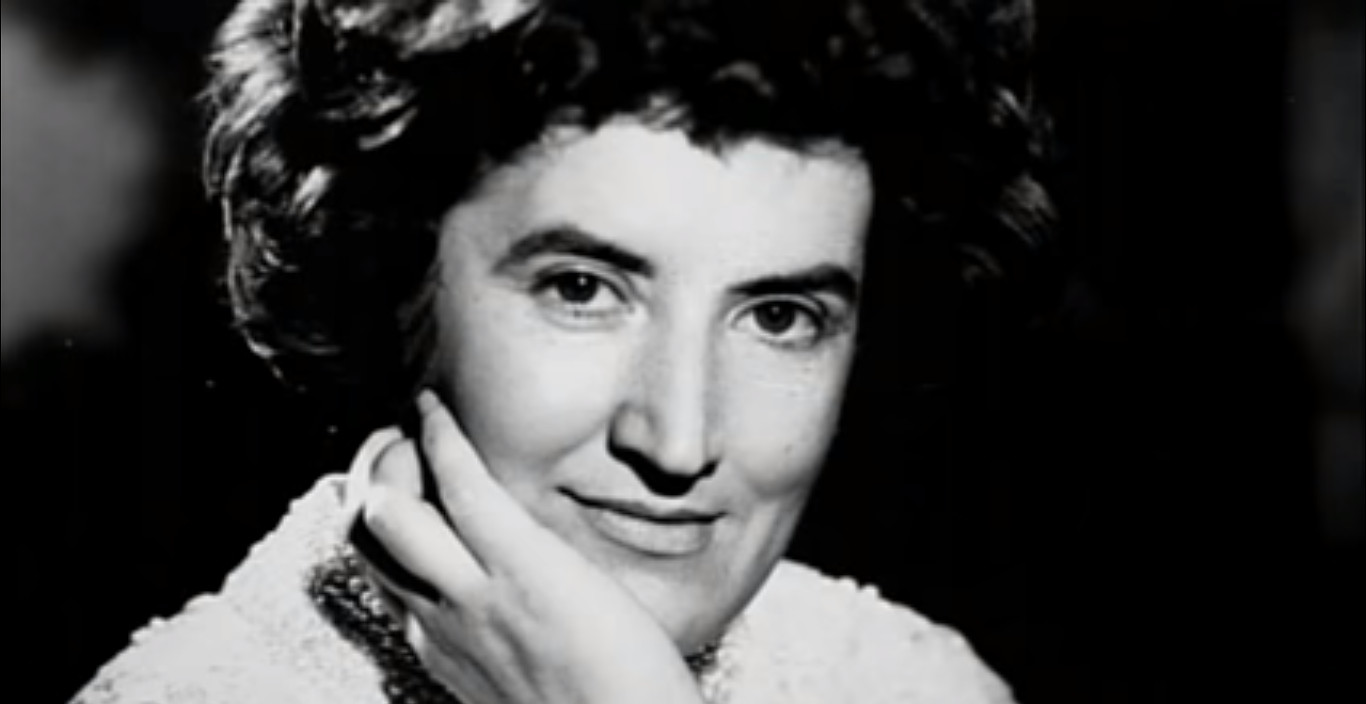
When the English concert pianist Joyce Hatto died in 2006, she was remembered as a national treasure for the brilliant playing on her later recordings. But then doubts arose as to whether the performances were really hers. In this week’s episode of the Futility Closet podcast we’ll review a surprising case of musical plagiarism, which touched off a scandal in the polite world of classical music.
We’ll also spot foxes in London and puzzle over a welcome illness.
In Notorious there’s a strangely chaste scene of passion in which Ingrid Bergman and Cary Grant hold one another, gaze into each other’s eyes, and declare their love, but only intermittently kiss. Grant even places a phone call during the clinch. The reason is the Hays code, a set of moral guidelines that Hollywood had adopted in 1930. Among other things, it declared that:
The sanctity of the institution of marriage and the home shall be upheld … Excessive and lustful kissing, lustful embraces, suggestive postures and gestures, are not to be shown.
The practical rule was that a screen kiss must not last more than 3 seconds. So Alfred Hitchcock simply toed that line. Bergman later recalled, “We just kissed each other and talked, leaned away and kissed each other again … the censors couldn’t and didn’t cut the scene because we never at any one point kissed for more than three seconds … we nibbled on each other’s ears, and kissed a cheek, so that it looked endless.” In fact it lasted two and a half minutes.

When architect Jørn Utzon submitted his plan for the Sydney Opera House, the shapes of the roof vaults were not defined geometrically. Without this information, engineers couldn’t calculate the complex forces and strains involved and make a plan for construction.
The team spent three years and hundreds of thousands of working hours trying to define the shapes as paraboloids and ellipsoids. Finally, in 1961, they realized that all the half-shells could be cut from the surface of a common sphere (below). This would lend a visual harmony to the whole complex and, since a sphere’s curvature is the same in all directions, it would permit the materials to be mass-produced.
“Each half-shell is now a spherical triangle,” explains University of Sydney mathematician Joe Hammer. “One side of the triangle is the ridge that is part of a small circle of the sphere. The other two vertices of the triangle are on the ridge. Each side shell is also a spherical triangle, the boundaries of which are small circles of the common sphere.”
In awarding Utzon the Pritzker Prize in 2003, Frank Gehry said, “Utzon made a building well ahead of its time, far ahead of available technology, and he persevered … to build a building that changed the image of an entire country.”
(Joe Hammer, “Mathematical Tour Through the Sydney Opera House,” Mathematical Intelligencer 26:4 [September 2004], 48-52.)
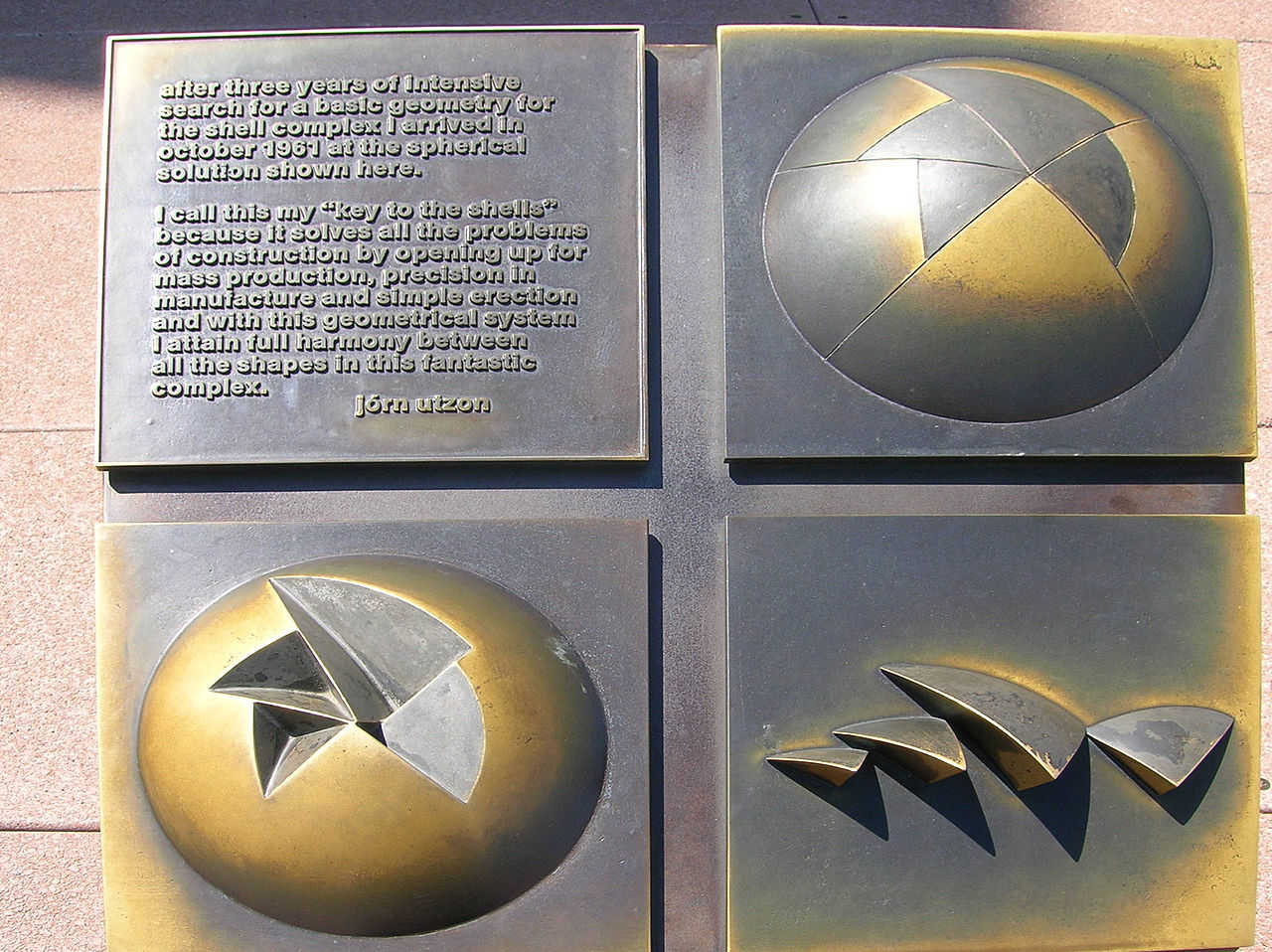
In the 13th century, when the Earl of Chester was imprisoned by the Welsh in Rhuddlan Castle, his constable, Roger de Lacy, rescued him by mustering “a multitude of the shoemakers, fiddlers and loiterers” from the local fair. Pleasingly, in return he was given jurisdiction over all the minstrels and “disorderly characters” in Cheshire. In 1216 de Lacy handed down this privilege to his tenant, Hugh Dutton, and it remained in Dutton’s family, generally recognized as a right to license county musicians, for 500 years. From E.M. Leonard’s Early History of English Poor Relief, 1900:
It was the custom for the lord of Dutton to hold a Court at Chester on Midsummer day and in 1498 he received from the whole body of minstrels four flagons of wine and a lance with fourpence halfpenny from each of them. A Court of this kind was held as late as 1756. In nearly all the statutes concerning vagabonds until that of 1822, the rights of John Dutton’s heirs were preserved, so that in the seventeenth century the minstrels of Cheshire, license by the lord of Dutton, might wander without fear of the penalty inflicted on wanderers elsewhere, — a curious but direct consequence of an incident of border warfare in the early part of the thirteenth century.
“Few facts illustrate better both the continuity of English history and the toleration of anomalies by English law than this perpetuation of the quaint jurisdiction of the house of Dutton for more than six centuries.” (More here.)
(Thanks, Keith.)

Victorian England had a vogue in “confession albums,” in which friends asked each other to record their answers to such questions as “What do you consider the most beautiful thing in nature?” and “What peculiarity can you most tolerate?” According to Evan Kindley in Questionnaire, “They functioned as a kind of intimate currency among the literate classes,” sometimes serving as a prop in courtship rituals.
And occasionally some prominent intellectuals submitted to them. Here’s Karl Marx:
The quality you like best: Simplicity
In man: Strength
In woman: Weakness
Your chief characteristic: Singleness of purpose
Your favourite occupation: Glancing at Netchen [his cousin]
The vice you hate most: Servility
The vice you excuse most: Gullibility
Your idea of happiness: To fight
Your idea of misery: To submit
Your aversion: Martin Tupper [an English writer of moralistic verses]
Your hero: Spartacus, Keppler [Johannes Kepler, the astronomer]
Your heroine: Gretchen [of Goethe’s Faust]
The poet you like best: Aeschylus, Shakespeare
The prose writer you like best: Diderot
Your favourite flower: Daphne
Your favourite dish: Fish
Your maxim: Nihil humani a me alienum puto [Nothing human is alien to me]
Your motto: De omnibus dubitandum [Doubt everything]
Some other responses: Friedrich Engels’ idea of misery was “to go to a dentist,” Arthur Conan Doyle’s present state of mind was “jaded,” and Oscar Wilde’s distinguishing characteristic was “inordinate self-esteem.”
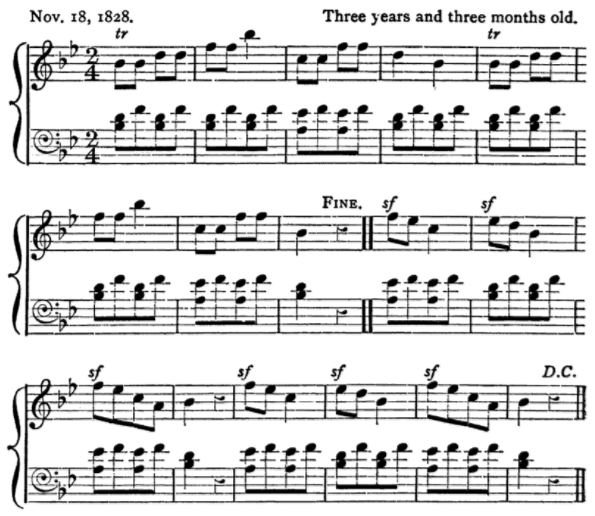
According to Barry Cooper’s Child Composers and Their Works, Frederick Ouseley (1825-1889) is “possibly the youngest child ever to compose a complete and coherent piece of music that still survives.” This piece is dated November 18, 1828, when Ouseley was 3 years and 98 days old. It was “apparently written down by his sister Mary Jane, for he began composing long before he learned to write; but his sisters appear not to have attempted to ‘correct’ his music in any way.”
Composer Sir John Stainer observed in 1889, “From the natural and easy way in which all the chords would fall under a tiny hand, there can be no doubt his sister succeeded in writing down exactly what he played and as he played.”
Perhaps ashamed of this trifling effort, Ouseley went on to compose an opera at age 8.
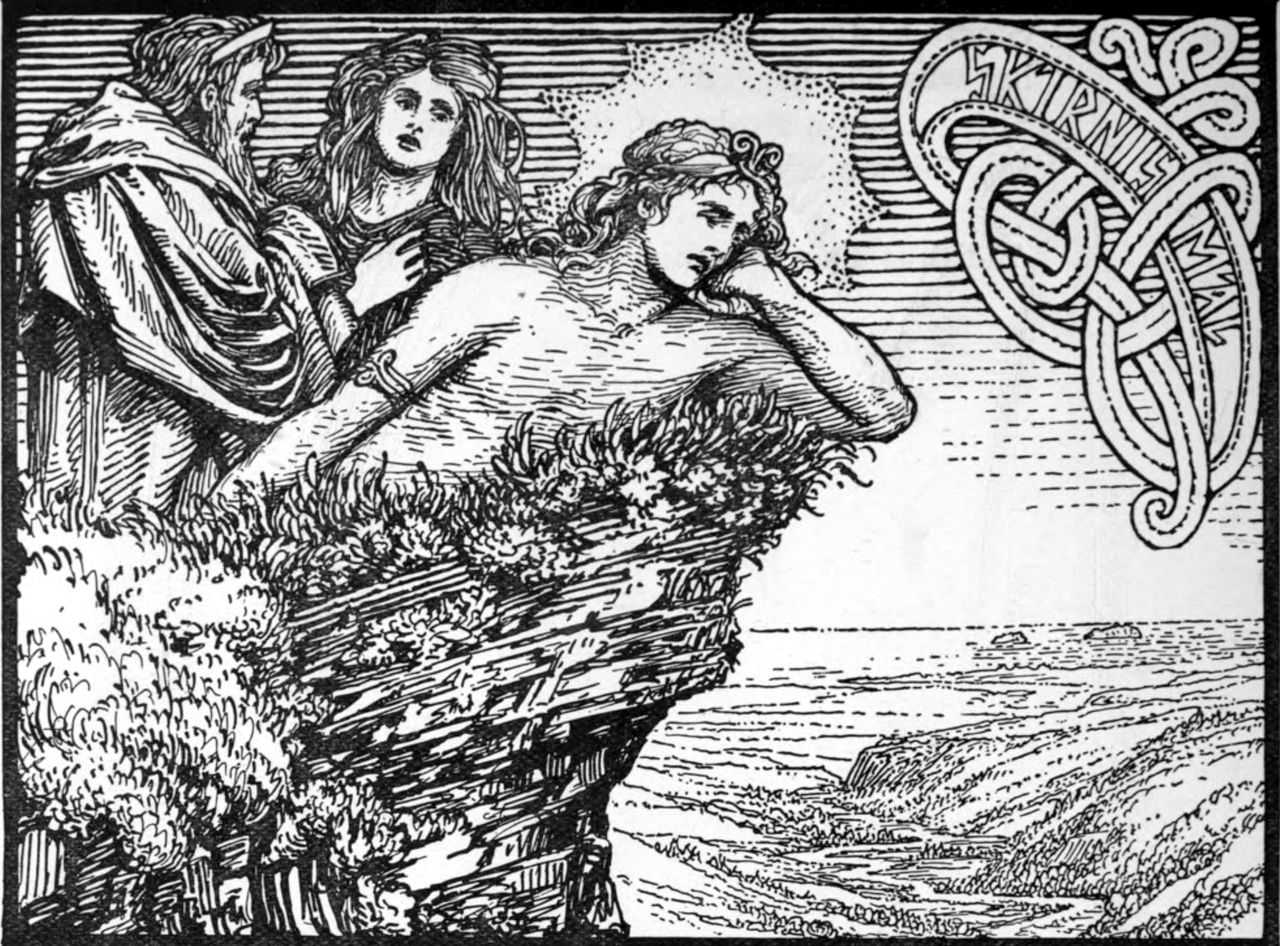
She who is always in my thoughts prefers
Another man, and does not think of me.
Yet he seeks for another’s love, not hers;
And some poor girl is grieving for my sake.
Why, then, the devil take
Both her and him; and love; and her; and me.
— Bhartrhari, 5th century CE, translated from the Sanskrit by John Brough
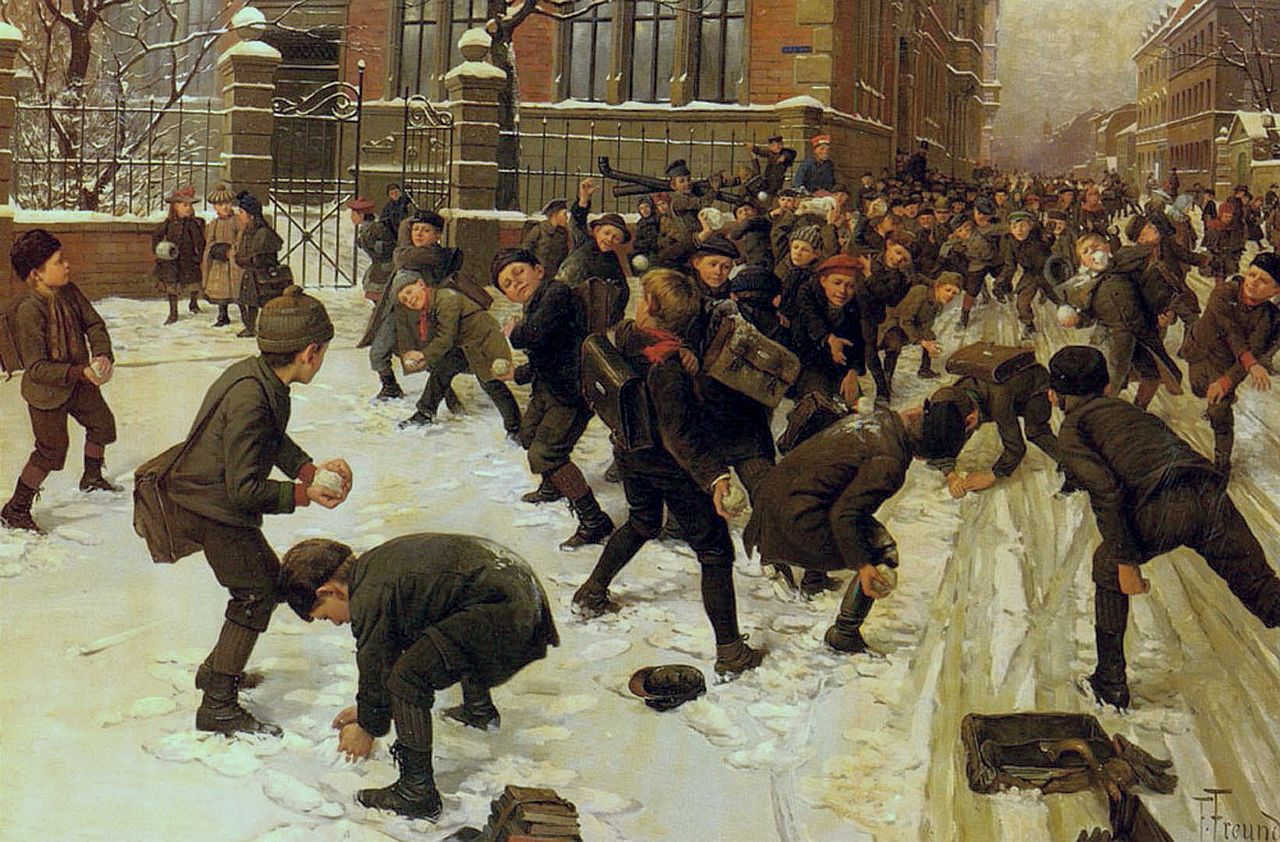
Salman Rushdie suggested that if Robert Ludlum had written Hamlet it would be called The Elsinore Vacillation.
Larry Rosenbaum observed that a gigolo is a million million billion piccolos.
The Greek god of theatrical criticism was named Pan.
Most pygmy hippos in American zoos are descended from William Johnson Hippopotamus, a pet given to Calvin Coolidge.
BISOPROLOL FUMARATE is an anagram of SUPER MARIO FOOTBALL.
Illinois considers Pluto a planet.
“It is as if children know instinctively that anything wholly solemn, without a smile behind it, is only half alive.” — Iona and Peter Opie, The Lore and Language of Schoolchildren, 1959

“The man who publishes a book without an index ought to be damned 10 miles beyond hell, where the Devil himself cannot get for stinging nettles.” — John Baynes (1758-1787)